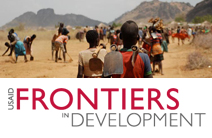- Agriculture and Food Security
- Democracy, Human Rights and Governance
- Economic Growth and Trade
- Education
- Environment and Global Climate Change
- Frontiers in Development
- Gender Equality and Women's Empowerment
- Global Health
- Science, Technology and Innovation
- Water and Sanitation
- Working in Crises and Conflict
Fostering Women's Leadership

Women are under-utilized in the effort to promote global well-being. They are under-represented at senior levels in government and business. They are a disproportionately small share of business owners, elected officials, students and peace mediators.
- Women’s marginalization works to the detriment of efforts to promote sustainable development.
- Women offer unique perspectives and views.
- When women participate in peace processes, they build coalitions across ethnic and sectarian lines and speak on behalf of other marginalized groups.
- More robust women’s participation in the economy can dramatically enhance the competitiveness and growth of economies.
- Whether it is ending a conflict, running a business, developing a life-saving treatment, or rebuilding a country, women have an enormous amount to contribute.
The 2010 Quadrennial Diplomacy and Development Review reflects our commitment to cultivating women’s leadership. It places women at the center of U.S. diplomacy and development—not simply as beneficiaries, but as agents of development, growth, stability, peace and reconciliation.
The United States’ National Action Plan on Women, Peace, and Security, and the Implementation of the Women, Peace and Security Action Plan, and USAID’s Gender Equality and Female Empowerment Policy further emphasize our intent to elevate women as leaders and increase the participation of women at all levels of decision-making.
USAID has significantly expanded efforts to support women’s leadership. The Agency provided financial support for female negotiators and for the inclusion of women in high level decision-making processes, including formal peace negotiations, donor conferences and transitional political processes.
Programs have been created to cultivate women leaders in business, academia and research; strengthen the skills of female legislators and legislative branch staff; foster women’s leadership as part of social protection programs; and elevate women’s leadership in the business community.
In 2012, USAID will support additional programs that promote women’s empowerment by:
- Improving women’s access to capital, markets and mobile technology
- Building women’s capacities and skills in agriculture
- Supporting women’s desires to own businesses
Our efforts will help maximize the leadership potential of women and leverage their skills for greater impact.
Learn More








Comment
Make a general inquiry or suggest an improvement.